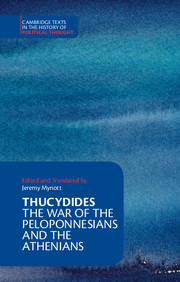Book contents
- Frontmatter
- Contents
- List of Maps
- Preface
- Introduction
- Principal dates
- Biographical notes
- Greek deities, heroes and mythological figures
- Greek terms for distances, coinage and the calendar
- Map 1. Greece and the Aegean
- Map 2. Peloponnese and Central Greece
- Map 3. Western Asia Minor and Hellespont
- Map 4. Sicily and South Italy
- The War of the Peloponnesians and the Athenians
- Introduction [I 1–23.3]
- Background to the war [I 23.4–146]
- First year of the war, 431–30 [II 1–47.1]
- Second year of the war, 430–29 [II 47.2–70]
- Third year of the war, 429–28 [II 71–103]
- Fourth year of the war, 428–27 [III 1–25]
- Fifth year of the war, 427–26 [III 26–88]
- Sixth year of the war, 426–25 [III 89–116]
- Seventh year of the war, 425–24 [IV 1–51]
- Eighth year of the war, 424–23 [IV 52–116]
- Ninth year of the war, 423–22 (IV 117–35)
- Tenth year of the war, 422–21 [V 1–24]
- Eleventh year of the war, 421–20 [V 25–39]
- Twelfth year of the war, 420–19 [V 40–51]
- Thirteenth year of the war, 419–18 [V 52–56]
- Fourteenth year of the war, 418–17 [V 57–81]
- Fifteenth year of the war, 417–16 [V 82–83]
- Sixteenth year of the war, 416–15 [V 84–116, VI 1–7]
- Seventeenth year of the war, 415–14 [VI 8–93]
- Eighteenth year of the war, 414–13 [VI 94–105, VII 1–18]
- Nineteenth year of the war, 413–12 [VII 19–87, VIII 1–6]
- Twentieth year of the war, 412–11 [VIII 7–60]
- Twenty-first year of the war, 411–10 [VIII 61–109, unfinished]
- Appendix 1 Notes on the Greek text: variations from the OCT
- Appendix 2 Thucydides in the ancient world: a selection of texts
- Bibliography and further reading
- Synopsis of contents
- Synopsis of speeches
- Glossary
- Index of names
- General index
- References
Tenth year of the war, 422–21 [V 1–24]
Published online by Cambridge University Press: 05 April 2013
- Frontmatter
- Contents
- List of Maps
- Preface
- Introduction
- Principal dates
- Biographical notes
- Greek deities, heroes and mythological figures
- Greek terms for distances, coinage and the calendar
- Map 1. Greece and the Aegean
- Map 2. Peloponnese and Central Greece
- Map 3. Western Asia Minor and Hellespont
- Map 4. Sicily and South Italy
- The War of the Peloponnesians and the Athenians
- Introduction [I 1–23.3]
- Background to the war [I 23.4–146]
- First year of the war, 431–30 [II 1–47.1]
- Second year of the war, 430–29 [II 47.2–70]
- Third year of the war, 429–28 [II 71–103]
- Fourth year of the war, 428–27 [III 1–25]
- Fifth year of the war, 427–26 [III 26–88]
- Sixth year of the war, 426–25 [III 89–116]
- Seventh year of the war, 425–24 [IV 1–51]
- Eighth year of the war, 424–23 [IV 52–116]
- Ninth year of the war, 423–22 (IV 117–35)
- Tenth year of the war, 422–21 [V 1–24]
- Eleventh year of the war, 421–20 [V 25–39]
- Twelfth year of the war, 420–19 [V 40–51]
- Thirteenth year of the war, 419–18 [V 52–56]
- Fourteenth year of the war, 418–17 [V 57–81]
- Fifteenth year of the war, 417–16 [V 82–83]
- Sixteenth year of the war, 416–15 [V 84–116, VI 1–7]
- Seventeenth year of the war, 415–14 [VI 8–93]
- Eighteenth year of the war, 414–13 [VI 94–105, VII 1–18]
- Nineteenth year of the war, 413–12 [VII 19–87, VIII 1–6]
- Twentieth year of the war, 412–11 [VIII 7–60]
- Twenty-first year of the war, 411–10 [VIII 61–109, unfinished]
- Appendix 1 Notes on the Greek text: variations from the OCT
- Appendix 2 Thucydides in the ancient world: a selection of texts
- Bibliography and further reading
- Synopsis of contents
- Synopsis of speeches
- Glossary
- Index of names
- General index
- References
Summary
Summer [V 1–12]
The next summer the one-year treaty had come to an end after being extended to the time of the Pythian Games; and during the truce the Athenians relocated the Delians from Delos, in the belief that because of some ancient offence they had still been in a state of pollution when consecrated and that there had also been an omission in the act of purification, though they had thought they had followed the correct procedure in removing the graves of the dead, as I recounted earlier. The Delians set off and each made their own way to settle at Atramyttium in Asia, which Pharnaces had made available to them.
After the truce expired Cleon got the agreement of the Athenians and sailed to the Thracian region, taking with him 1,200 Athenian hoplites and 300 cavalry, plus a larger force of allied troops and thirty ships. He first put in at Scione, which was still under siege, and taking on some additional hoplites from the garrison there he sailed down to the Toronaean port of Cophus, which is not far from the city. From there, when he gathered from deserters that Brasidas was not in Torone and that those in the city were no match for his own force, he marched his infantry into the city and sent ten ships to sail round to the harbour. He first came to the surrounding wall that Brasidas had thrown around the city. Brasidas was wanting to include the suburb within it and after demolishing part of the old wall he had thus made one city of Torone.
- Type
- Chapter
- Information
- ThucydidesThe War of the Peloponnesians and the Athenians, pp. 320 - 337Publisher: Cambridge University PressPrint publication year: 2013



